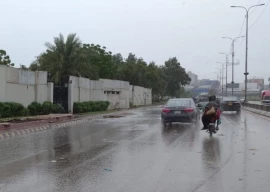
KARACHI: All “unnecessary” transfers of police officers assigned with investigation of heinous crimes are to be stopped.
“It is essential that the [same] officers who initiate the investigation of criminal cases continue with it and finally submit the charge-sheet in courts to conclude the cases,” said Sindh Inspector General of Police (IGP) Fayyaz Leghari while speaking to police officers during a meeting at the central police office.
Any new investigation officer needs time to understand the case, owing to which he faces problems during the case hearing, said the Sindh police chief, calling for an immediate ban on the unnecessary transfer of such investigation officers.

Leghari also directed not to assign investigation officers any security duties so that they could focus on probing their cases. The investigation of cases related to targeted killings, kidnapping for ransom, murder, killings during robbery and other such crimes would be the joint responsibility of respective station house officers and investigation officers, he added.
He directed the zonal DIGs and SSPs to hold case-to-case reviews of all investigation matters and submit the detailed report of their meetings. All Investigation SSPs were told to take along forensic experts from the start of investigation of heinous crimes and ensure strict implementation of directives and observations of courts during the hearings.

Leghari also called for assigning senior and experienced police officers for investigation and arrange short term training courses for other officers so that they could learn to look into the cases on scientific lines using modern equipment.
Published in The Express Tribune, December 10th, 2012.



























1713425884-0/Tribune-Collage-Feature-Images-(10)1713425884-0-270x192.webp)
















COMMENTS
Comments are moderated and generally will be posted if they are on-topic and not abusive.
For more information, please see our Comments FAQ